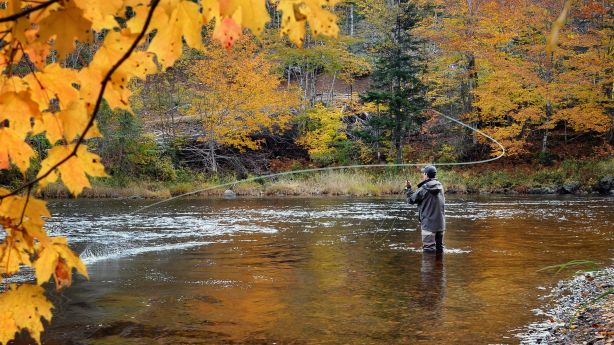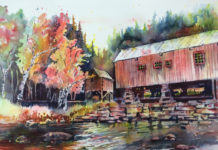SALT LAKE CITY — We’ve all seen them: guys and gals “standing in a river waving a stick,” as writer John Gierach aptly titled one of his collections of fishing essays.
But what is it that drives the passion behind the sport of fly-fishing? Is it a sport, a hobby or a way of life?
Why people fly-fish
These questions were posed to fly fishermen on an online forum group with answers coming anonymously. There were not many responses. The few who did respond could not answer the question of whether fly-fishing was a way of life, but they were more forthcoming with answers about the passion behind it.
Even so, trying to define the passion for them was difficult. Most responses were about how they came to be fly fishermen and how long they had been doing it.
Anonymous responses using only their forum names hinted toward their passion.
“I love hitting the river as much as possible, but there are plenty of other pursuits in life I enjoy way too much to give up for fly-fishing,” one person responded.
“As for ‘way of life,’ for me…no. I love it. It makes me happy. I do feel it is a part of my life and a part of who I am,” added another.
Another person said: “I fly fish because it is clean (no worm guts or bait canteen). You don’t just reel them in and it is challenging. I just wish I had started earlier in life.”
Others that chimed in mentioned the power of quietness.
“I love it and crave the solitude I only seem to find while casting flies on a small stream,” wrote one.
Another said they enjoyed “the complex simplicity.”
“Except for leaky waders and snags, there is no downside. It’s fishin’ and, as they say, time spent fishing isn’t deducted from your life.” they continued.
The question of passion was then directed to a select group of seasoned fly fishermen. These are individuals who have been involved in fly-fishing and fly tying from an early age.
Two of the fly fishermen questioned were inducted into the Utah Fly Fishing Hall of Fame. Their great accomplishments were in regards to habitat protection, conservation of species, stream access and also promoting the sport through organizing Trout Unlimited chapters, and teaching at fly-fishing or fly-tying expositions.
The heart of the question is still about passion. What is it that motivates them to get to the river or lake?
The passion of method and place
Kirk Larsen, a veteran of the sport explained his passion in concise specific sentences.
“Being on the river and only hearing the sound of moving water,” he said. “The art of landing the fly gently and perfectly in the right spot for that sipping trout. The rush and excitement when the fish takes the fly and tightens the line. The anticipation wondering what type of trout and how big.
“Learning from experiences on what works and what doesn’t at different times of year and different conditions,” he continued. “The disappointments and yet great triumphs with multiple fish days that make up for it. The beauties that nature has created for us to enjoy.
The passion of learning and sharing
Then there’s Tom Doxey, a veteran fly fisherman and fly tier with around 60 years of experience. He’s an inductee into Utah’s Fly Fishing Hall of Fame.
“To me, there is no greater thrill than to create a fly from scratch and seeing the end result when a small native cutthroat in a small local stream takes my offering or when a giant brown trout explodes on a big stonefly on the Madison River,” he said. “It never gets old. It is my hope that I can continue to pass it on for a long time to come.”
Doxey’s passion is not only found at the river or lake, but in learning from others and teaching others himself.
“I watched someone tie some flies and he gave me a couple. I caught my first fish on a fly with one of those flies. Over the years, I have had the privilege of learning the art of fly-tying from some of the best tiers of this era,” he said. “I have tried hard to learn from those who have inspired me and try to pass it on to anyone who has an interest. Since I’ve retired, I have been teaching tying and fishing classes locally and really enjoy helping others.”
The passion of conservation
Wes Johnson, another Utah Fly Fishing Hall of Fame inductee, had early beginnings too. He started fly-fishing with a spinning rod, bubble and fly when he was about 12 years old. A couple of years later, he was fishing with gear specific to fly-fishing.
With over 22 years as a weatherman for the Air Force, Johnson developed a greater appreciation for what was happening in the environment. During assignments, he learned about the local fisheries and became interested in conservation and fisheries management. He joined Trout Unlimited 35 years ago as a way to use his expertise in conservation and fisheries management.
After settling in Utah, Johnson began to search for others with his same passion for fly-fishing and conservation. This led to his starting the Weber Basin Anglers Chapter of Trout Unlimited.
“Our TU chapter worked on many conservation projects with the northern region of the Division of Wildlife Resources. These projects include stream restoration and population sampling of our local steams,” he said. “This association was rewarding to the environment and my soul.”
Johnson was not done. His passion led him to get further involved with the Utah Division of Wildlife Resources, where he helped start the Blue-Ribbon Fishery Advisory Council to help maintain quality fishing opportunities around the state. He also helped form the Utah Anglers Coalition to unite all anglers in Utah.
When it comes to actual fly-fishing, he said there were many reasons for his passion.
“The solitude or companionship of sharing a stream, lake, river or pond with another in an outdoor setting is settling to one’s inner being,” he said. “(T)he peace and serenity of a mountain stream, valley river or calm lake is ever soothing to one’s soul — having a fly rod in hand and a box of homemade flies? Heaven.”
The passion of creativity
Paul Stimpson is another seasoned fly fisherman.
“Fly-fishing has kept my interest throughout my life because the reasons I fish have changed as I’ve gained experience in the sport and grown older,” he said. “I started fly-fishing as a young boy in order to spend time with my father. Then, when I realized it was possible to catch a fish with a fly, I wanted to catch a lot of fish.
“As I grew older, I wanted to catch larger fish. As my experience grew, I wanted to catch selective fish which piqued my interest in fly tying,” he continued. “I then wanted to develop flies that would catch the difficult fish. As I got more involved in fly tying it satisfied my need to be creative. I can’t sing or dance but with some practice, I could tie a fly that could fool a selective fish.”
Stimpson was a sought-after demonstration fly-tier for many years. His talent was noticed by the late Gary LaFontaine, who invited Stimpson to tie his flies at fly-fishing expos when his amyotrophic lateral sclerosis took his ability to tie away.
“In my later years, catching fish has become secondary,” Stimpson said. “Now I enjoy the places that fish live and the people that I fish with.”
The passion complete
Writer and fisherman Robert Traver summed up most fly fishermans’ sentiments when he penned his famous “Testamant of a Fisherman.”
Wherein he wrote: “I fish because I love to … because I love the environs where trout are found, which are invariably beautiful,” he wrote. “Because, in a world where most men seem to spend their lives doing things they hate, my fishing is at once an endless source of delight and an act of small rebellion … And, finally, not because I regard fishing as being so terribly important but because I suspect that so many of the other concerns of men are equally unimportant — and not nearly so much fun.”
More stories you may be interested in
Credit: Source link






























